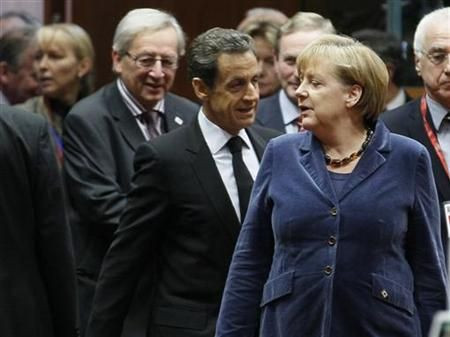The Danger and Absurdity of the Greek Credit Default Swaps Controversy
ANALYSIS

There is a Greek credit default swaps controversy brewing.
Credit default swaps are insurance-like policies that protect against the default of the underlying instrument. When a country like Greece defaults, the policies of Greek credit default swaps are supposed to pay out the insurance-like claims.
Last night, Eurozone leaders struck a deal with bankers that has the private sector accept 50 percent losses on Greek bonds.
One would think that such a steep loss would constitute a default and therefore trigger the payout on Greek credit default swaps.
However, Eurozone leaders are billing this deal as a “voluntary” agreement with private sector bondholders, which would not trigger credit default swaps.
The International Swaps & Derivatives Association (ISDA) will make the final decision on whether or not the deal was indeed “voluntary.”
Some analysts (and undoubtedly holders of Greek credit default swaps) do not buy the “voluntary” claim of Eurozone authorities.
“The deal last night was voluntary at the point of a gun,” said Peter Boockvar, equity strategist at Miller Tabak.
Boockvar said if the ISDA actually rules in favor of Eurozone authorities, it would “make a complete joke of sovereign CDS and will potentially destroy this market.”
Sovereign credit default swaps have always been controversial, especially in the context of the European debt crisis.
A few Eurozone policy makers have accused investors of using them as purely speculative instruments to exacerbate the European debt crisis. Some of them undoubtedly wish that the entire market did not exist.
Boockvar, however, pointed out that some private sector investors also use sovereign credit default swaps to hedge their sovereign debt exposure.
If this market did not exist, they would be forced to either short the sovereign debt itself or cut their entire exposure to the sovereign debt (e.g. not lend the country any money at all).
These two actions could worsen the sovereign debt crisis and presumably create a less attractive world than one with a functional sovereign credit default swaps market.
There is also the matter of rule of law and fairness in the financial markets.
Eurozone leaders have already changed the rules mid-game by enacting short selling bans at various times. If they also strong-arm holders of Greek credit default swaps, they may head down a slippery slope of regulatory capriciousness and lose investors’ trust.
“EU officials better be careful what they wish for the holders of Greek CDS,” said Boockvar.
© Copyright IBTimes 2024. All rights reserved.





















